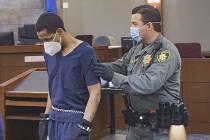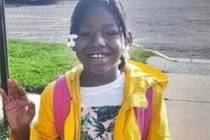Las Vegas police sergeant’s book explores depression, suicide
More than 20 years into Sgt. Clarke Paris' career at the Metropolitan Police Department, he made a terrifying realization.
He was depressed.
Two decades of bad memories -- which Paris calls "cop stew" -- boiled in his brain: Dead babies, teen suicides, fights, car crashes, rape victims, police shootings, murders.
Paris tried to ignore the symptoms of post-traumatic stress disorder. He had never killed anyone. His partner never died in his arms. He had no right to feel this way, he thought.
As the stress worsened, Paris decided he had to tell his wife, Tracie. He picked a day when his kids were out of the house and she lounged in the pool.
He couldn't control the sobs as he spoke, but it felt good, like a weight had been lifted from his shoulders. Then Tracie replied.
"There was no sympathy as she responded in a tone of sheer disgust and said, 'Are you kidding me?' " Paris wrote in, "My Life For Your Life," his book on police depression and suicide.
THE DAY IN THE POOL
A reader might expect the next chapter to begin, "And after the divorce..." But the couple remain married, and their relationship is stronger than ever.
Since that day in August 2007, the couple have given police suicide prevention seminars across the country.
"The Day in the Pool" story, as it's described in the book, is a big part of the lecture.
"The story takes an hour, and that was the turning point for the seminar. People started saying, 'I thought you were telling my story up there,' " Paris said.
After Paris finishes his pool story, it's Tracie's turn to tell her version of events.
"I did not know what to think as my husband was breaking down right in front of me. I was truly frightened," Tracie wrote in the book, a written version of their "The Pain Behind the Badge" seminars.
After realizing her husband didn't have cancer, Tracie was furious. She was a trauma nurse, and the couple always talked to each other about their jobs.
"What had he been hiding? Why didn't he ever reveal to me he was struggling? Were we going to lose our house? What about all of our children who still need to go to college?" Tracie wrote.
She later came to realize later that, "if you are not a police officer, you will not understand the job of a police officer."
A NATIONAL PROBLEM
Robert E. Douglas Jr., founder and executive director of the National Police Suicide Foundation, cites an FBI agent's research that contends an officer commits suicide every 17 to 21 hours. The ratio of police suicides to line-of-duty deaths could be as high as 3-to-1, Douglas said.
Only 3 to 5 percent of the 18,000 agencies offer suicide awareness training to their personnel, about 775,000 officers nationwide, he said.
Douglas blames a cultural bias about suicide among police and even the general population.
"It's something you don't talk about, or you just deal with," he said. "This brings about a real challenge because if you have issues within a family or organization that you don't address, it doesn't get better. It gets worse."
Paris said the Police Department's awareness training is top-notch, and their Police Employee Assistance Program is first-rate. In the past five years, the Police Department has seen one suicide -- a corrections officer in 2007, according to a police spokesman.
The agency spends millions on mental health, Paris said.
"But the cops have to accept it. That's the key," he said.
It took Paris a "long time" to accept that he was struggling. He was in disbelief because he thought his career had been less violent.
But it doesn't take a major event, such as a shooting or a major tragedy, to build stress.
"You mean, cumulative stress is normal? That's normal? I'm not a coward or a sissy?" Paris recalled thinking. "Well, yeah, of course it's not normal to be OK when you see dead people or if you fight with somebody and you hurt them."
Even in Paris' darkest days, he never was suicidal, he said. But he was headed down that road.
"I just didn't hit the mile marker yet," he said.
"I thank God for that day in the pool," Tracie said. "I get choked up thinking if it had never happened. I can only speculate, but hearing stories and seeing what people have gone through, there would have been divorce, I'm sure. ... He could have turned to alcohol, to completely isolating himself from things. So much destruction can come."
REQUIRED READING
Christian Dobratz, a retired police sergeant and a professor at Minnesota State University, Mankato, made Paris' book required reading for his class.
Dobratz began suffering from PTSD midway through his 18-year police career in Minnesota.
"I know what depression is like, and how lonely it can be and the anxiety that goes with it," he said.
He met Paris after the couple lectured at the university last year. The seminar was eye-opening for the students, he said.
Police administrators understand PTSD better today than in the past, but the stigma still exists.
After Dobratz returned to duty, one supervisor told him, "I didn't know what to say to you. I didn't understand how you couldn't suck it up and come back to work the next day," he recalled.
"This is a career that, to me, still has a lot of machismo," Dobratz said. "It's dominated by white, Anglo males where a lot of them think it's not OK to cry."
Paris said the machismo culture of police is the biggest hurdle.
Officers don't want to seek help because they fear losing their job or don't want to hurt their image in the eyes of family and friends.
When Paris lectures to young officers, they never believe they could become suicidal.
"When cops graduate and people say, 'You might get killed someday,' they say 'I know that. I'm willing to take that chance,' " he said. "If they say, 'You're gonna commit suicide,' they say, 'Shut up, I won't do that.' "
CHANGING THE CULTURE
Paris has spoken to about 10,000 officers since he began lecturing four years ago. He gravitated to seminars after his documentary on police suicide, a passion project and an outlet to combat his own depression, went unsold and largely unseen.
He spoke to officers involved in the Virginia Tech massacre in 2007 and to police in Lakewood, Wash., after four officers were murdered in a coffee shop.
In his book, Paris published several essays written by family members to officers who had killed themselves.
That section of the book hit home for Dobratz.
"If other cops read the book and see the hell they put their families through simply because they couldn't say 'I need help,' that reason alone is why this should be required reading material," he said.
Paris said the culture must change before the national suicide numbers drop significantly.
He has one message for officers: "You can be in touch with your emotions and still be one bad-ass dude," he said.
Contact reporter Mike Blasky at mblasky@review journal.com or 702-383-0283.




























